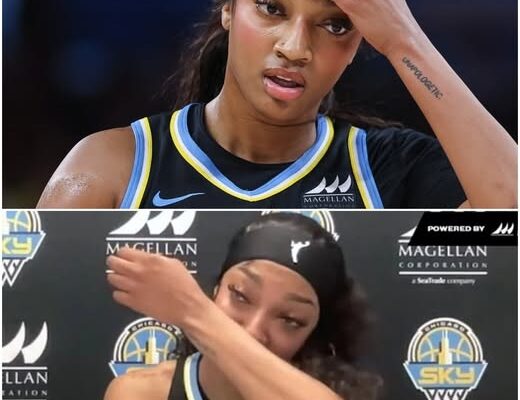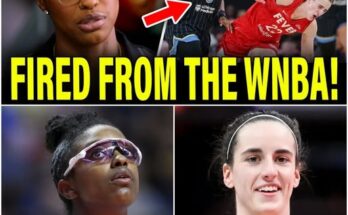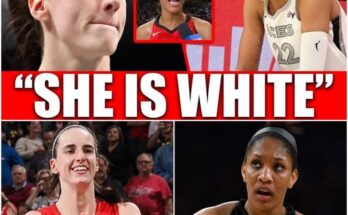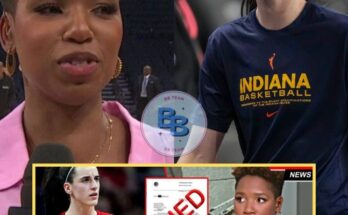“They Don’t Respect Me Just Because I’m Black”
The Moment Angel Reese Broke—And What the WNBA Did Next
The fluorescent lights buzzed faintly overhead, casting a sterile glow on the long, silent hallway. Angel Reese sat alone in the media room’s waiting area, her elbows on her knees, eyes fixed on a single white index card sitting facedown in her palm. The edges were frayed — she’d been folding and unfolding it for the past six minutes.
A staffer had handed it to her before the interview. Just a prep question, they said. Something light.
“Do you feel supported by the league?”
She didn’t flip it over again.
Not because she didn’t know what it said —
but because she already knew the answer.
Behind the thin walls, the press room murmured with energy: camera crews repositioning, mics being tested, a WNBA rep quietly coordinating with producers. But where Angel sat, it was quiet. Cold.
She didn’t rehearse her words.
She didn’t run through talking points.
She just breathed.
And tried not to break before the camera turned on.
**
For a long time, Angel Reese thought silence was strength.
She had learned early: keep your head down, grind, let the numbers speak. But the numbers didn’t stop the commentary. They didn’t soften the side-eyes, the coded headlines, or the whispers about her being “too much.”
She was used to pressure. She wasn’t used to being picked apart by the very league that had drafted her with applause.
Now, months into her rookie season, the applause was gone.
Replaced by critiques that rarely mentioned her game.
She smiled too little.
She celebrated too loud.
She didn’t “carry herself like a professional.”
And every week, the spotlight felt heavier.
Not because of how bright it was —
but because of how cold it felt.
**
The interview wasn’t supposed to be emotional.
It was just postgame. Standard. Short.
Three questions in, the reporter — a young woman, maybe mid-thirties — asked what it’s been like adjusting to the league’s expectations.
Angel paused.
The question wasn’t mean. It wasn’t even loaded. But for some reason, it hit differently that night.
Maybe because she’d just spent 36 minutes being heckled from the sideline — not by fans, but by a courtside commentator who didn’t flinch when calling her “a liability.”
Maybe because a teammate hadn’t said a word to her in the locker room. Again.
Or maybe because she’d been up the night before reading anonymous comments under a highlight reel where she’d pulled down 15 rebounds and still got called “overrated.”
She looked down. Her hands were trembling slightly.
“I’m constantly being judged, nitpicked, and questioned…” she said slowly. “I’m human. I’m trying to be strong. But this… this is breaking me.”
There was a pause.
And then came the words that would ignite the storm.
“They don’t respect me… just because I’m Black.”
**
The silence that followed wasn’t staged.
It wasn’t dramatic.
It was real.
The reporter didn’t blink. The producer in the back of the room exhaled audibly. The sound tech froze mid-adjustment.
The sentence hadn’t been screamed. It hadn’t even been said in anger.
It was quiet. Raw. Shattering.
And no one in the room moved.
**
Outside, in the hallway, a young WNBA assistant stood listening with a clipboard pressed to her chest.
She had idolized Angel in college. Had her jersey. Had defended her online more times than she could count. And now, standing twenty feet from her hero, she couldn’t move her feet.
She wasn’t part of the camera crew. Wasn’t supposed to be on set.
But she stayed.
Just long enough to hear the moment the strongest voice in the league cracked.
And for reasons she couldn’t explain, she felt ashamed.
Not for Angel.
For not doing anything.
**
The clip hit social media within 30 minutes.
No music. No edit. Just raw footage from the media room: Angel Reese sitting still, holding back tears, uttering five words that would divide the league.
“They don’t respect me… just because I’m Black.”
Some fans responded instantly:
“She said it. Finally.”
“You’re not alone, Angel.”
“This league doesn’t deserve you.”
But just as quickly came the backlash:
“She’s playing the race card.”
“Maybe focus more on your shooting percentage.”
“She brings this on herself.”
One former analyst went live on Instagram to say:
“Look, I respect what she’s done. But everything can’t be about race. Sometimes it’s just basketball.”
His comments trended. So did the ratio under them.
**
The WNBA issued no statement that night.
No support tweet.
No league repost.
But Caitlin Clark did trend.
Not for saying anything —
but for saying almost nothing.
When asked about Angel’s comments the next morning, she paused and offered this:
“Mental health matters. I want everyone in the league to feel supported. That’s what’s important.”
To some, it was classy. Professional.
To others, it was calculated distance.
“She won’t even say Angel’s name,” one fan noted.
But Clark didn’t take the bait. She rarely does.
And that — in a media landscape built on spectacle — made her the perfect contrast.
The silence became part of the story.
**
Backstage, behind closed doors, the league was scrambling.
Angel’s agent had already fielded five media requests. One executive asked quietly, “Is she planning to apologize?”
“No,” the agent replied. “She meant every word.”
A marketing director raised a different concern: “Is this going to impact our sponsor activations?”
Another, more quietly: “Do we need to protect her… or distance?”
No one answered.
And that, Reese would later say in private, was the most honest response of all.
**
What Angel Reese said wasn’t new.
It was just undeniable.
Because for years, confident Black women in sports have been asked to shrink themselves to fit the frame.
To smile wider.
To celebrate softer.
To never — ever — make the room uncomfortable.
And Angel had done the opposite.
She didn’t soften.
She didn’t shrink.
She didn’t flinch.
And that, more than any stat line, had made people nervous.
**
That night, alone in her hotel room, Angel sat at the edge of her bed with the lights off.
The white index card from earlier still sat on the nightstand.
She hadn’t thrown it away.
She stared at it.
“Do you feel supported by the league?”
She reached for a pen. Wrote a single word underneath.
“No.”
Then folded the card.
And slid it into the pocket of her game duffel.
She would keep it.
Not as a reminder of the pain —
but of the moment she stopped pretending.
THE AFTERSHOCK
What the WNBA Didn’t Say—And Why That Silence Now Speaks Louder Than Ever
The morning after the clip aired, the WNBA’s social media team met at 8:30 a.m.
The trending page was still hot. #AngelReese, #TheyDontRespectMe, #MentalHealthMatters—all climbing. Engagement was up 400%. The comms director refreshed the page again. The reel of Angel’s five-word sentence had passed 10 million views overnight. No music. No graphics. Just raw.
“What’s our response?” one team member asked.
The room was quiet.
“I mean—do we amplify it?”
“Or would that make it worse?”
A beat.
The VP of media relations looked up from his phone and said, almost too casually:
“Let’s monitor.”
**
The statement never came.
No post from the WNBA. No official message of support. Not even a retweet of Angel’s original interview.
When a sports journalist tweeted, “Still waiting for the league to say something about Angel Reese,” the league account liked a highlight reel of another game instead.
Angel noticed.
Not because she expected a tribute.
But because she knew what silence meant in this industry.
She’d been on the other side of it before.
She knew when support was sincere.
And she knew when it was politically inconvenient.
**
Behind the scenes, executives debated quietly.
One communications strategist warned: “If we post anything now, it’ll look reactive.”
Another countered: “If we say nothing, it’ll look complicit.”
Someone suggested resharing a general mental health initiative the league had posted weeks earlier.
“It’s too corporate,” someone else said. “It’ll get dragged.”
By noon, they all agreed: Wait. See how it plays out.
But by then, it already had.
The silence had spoken.
And the fans were watching.
**
Inside one team’s locker room, a coach printed out Angel’s quote and taped it above the door.
Not as protest.
As a reminder.
One of her players later said, “It’s not about picking sides. It’s about recognizing when something real is happening — and not freezing.”
Another coach, speaking anonymously, said, “Some of us have known this was coming. It’s just that now? No one can say they didn’t hear it.”
**
That evening, ESPN ran a segment titled “The Moment That Shook the WNBA.”
Clips of Angel. Reactions from analysts. A clip of Clark’s neutral response. A few sanitized quotes from executives saying “we value every voice.”
But the freeze moment was still what everyone remembered.
The moment Angel stood up from the interview chair.
Looked around the room.
No one clapped.
No one came.
Just posters of WNBA legends behind her.
And her footsteps—soft, steady, unaccompanied—down the hallway.
One producer later admitted: “I almost stood up. I don’t know why I didn’t.”
She had carried the moment alone.
And now the league had to carry the weight of what it chose not to say.
**
In the following days, something unexpected happened.
Rookies in other teams started posting black-and-white selfies with no captions.
Some players reposted Angel’s quote.
One veteran guard wrote:
“Every time we speak up, they ask us to calm down. But silence isn’t peace. It’s pressure.”
The league never reposted those either.
But fans did. By the millions.
The message had already escaped the filter.
**
As for Angel?
She returned to practice the next day. No interviews. No makeup. Just her jersey, headphones, and a look no one could decode.
Someone asked her if she’d seen the numbers — the surge in followers, the spike in engagement.
She nodded. “I’m not here for clicks.”
Then walked into the gym, tied her shoes, and started running drills.
The sound of her sneakers hitting the court was sharp, rhythmic, almost defiant.
And somewhere in her duffel bag, folded between tape and towels, was a white index card.
Still creased. Still unreadable.
Still hers.
**
Because that’s the part people forget about strength.
It doesn’t always roar.
Sometimes, it just… stays.
Quietly. Unapologetically.
Present.
Not because it was invited.
But because it refuses to leave.
Disclaimer:
This narrative is shaped by public events, widely observed dynamics, and recurring patterns across sports, culture, and media. It has been constructed with a focus on emotional clarity, symbolic resonance, and interpretive depth—designed to reflect the larger tensions that often unfold around performance, perception, and public voice.
Certain sequences, reactions, or characterizations have been stylized for storytelling cohesion and thematic emphasis. They do not reflect direct transcripts, official statements, or verified events, but rather seek to capture how stories are experienced, interpreted, and shared in real time.
No disrespect or misrepresentation is intended toward any individual, organization, or audience. The intent is to explore how narrative moments—on the court, on the screen, and in the public eye—can reveal something deeper than stats, headlines, or rivalries.
Ultimately, this piece invites thoughtful engagement with the evolving role of visibility, conflict, and legacy in the way modern sports—and modern moments—are remembered.



